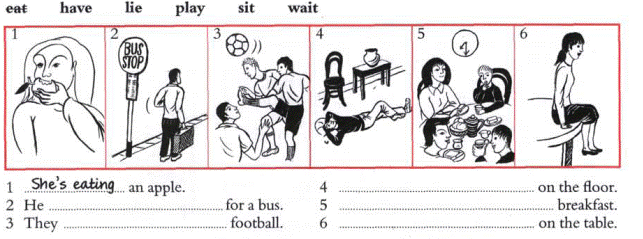 |
|
АкушерствоАнатомияАнестезиологияВакцинопрофилактикаВалеологияВетеринарияГигиенаЗаболеванияИммунологияКардиологияНеврологияНефрологияОнкологияОториноларингологияОфтальмологияПаразитологияПедиатрияПервая помощьПсихиатрияПульмонологияРеанимацияРевматологияСтоматологияТерапияТоксикологияТравматологияУрологияФармакологияФармацевтикаФизиотерапияФтизиатрияХирургияЭндокринологияЭпидемиология |
PRESENT CONTINUOUS ACTIVE (НАСТОЯЩЕЕ ДЛИТЕЛЬНОЕ ВРЕМЯ)
Present Continuous употребляется: · для выражения длительного действия, совершающегося в момент речи: Look! It’s raining. · для выражения длительного действия, совершающегося в настоящий период времени, хотя не обязательно в момент речи: My mum’s learning English in the evenings. · для обозначения намерения совершения будущего действия или уверенности в его совершении: We are playing tennis tomorrow. Present Continuous не употребляется с глаголами, выражающими чувства, восприятия и умственные состояния: like, love, hate, want, need, prefer, know, realize, suppose, mean, understand, believe, remember, belong, contain, consist, depend, seem: I like this music. (NOT I. УТВЕРДИТЕЛЬНАЯ ФОРМА ” + to be + Ving I am writ ing now. You are read ing now. He/she/it is eat ing now. We are go ing now. They are talk ing now.
II. ВОПРОСИТЕЛЬНАЯ ФОРМА To be + ” + Ving? Am I writ ing now? Are you read ing now? Is he/she/it eat ing now? Are we go ing now? Are they talk ing now? III. ОТРИЦАТЕЛЬНАЯ ФОРМА ” + to be +not+Ving I am not writ ing now. You are not read ing now. He/she/it is not eat ing now.
They are not talk ing now.
1. Participle I образуется путем прибавления суффикса -ing к форме инфинитива смыслового глагола без частицы to: play-playing study – studying 2. Если глагол оканчивается на согласную + е, конечное -е опускается, и к глаголу прибавляется суффикс –ing: write – writing make – making 3. Если глагол оканчивается на краткий ударный гласный + согласный, то конечный согласный удваивается: p – pping tap – tapping m – mming swim – swimming g – gging jog – jogging t – tting cut – cutting Exercise 22. Put the verbs into the –ing form.
Exercise 23. What are these people doing? Use these verbs to complete the sentences.
Exercise 24. Use the words in brackets to complete questions. 1. ______________ this week?’ ‘No, he’s on holiday’. (Colin/work) 2. ‘Why ______________ at me like that? What’s the matter?’ (you/ look) 3. Jenny is a student at university’. ‘Is she? What ______________?’ (she/study) 4. _____________ ____________ to the radio? Or can I turn it off?’ (anybody/listen) 5. How is your English? ______________ better? (it/ get)
Exercise 25. Put the verb into the correct form. Sometimes you need the negative. 1. I’m tired. I ______________ (go) to bed now. Goodnight! 2. We can go out now. It ______________ (rain) any more. 3. ‘How is your new job?’ “Not so good at the moment. I ______________ (enjoy) it very much.’ 4. Catherine phoned me last night. She’s on holiday in France. She ______________ (have) a great time. 5. I want to lose weight, so this week I ______________ (eat) lunch. 6. Angela has just started evening classes. She ______________ (learn) German. 7. I think Paul and Ann have had an argument. They ______________ (speak) to each other.
Дата добавления: 2015-02-05 | Просмотры: 1508 | Нарушение авторских прав |
 We are not go ing now.
We are not go ing now.
